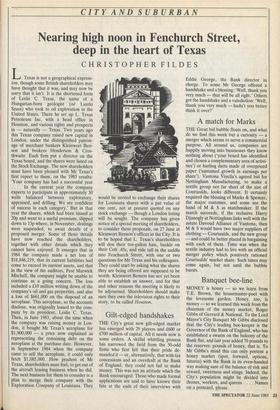CITY AND SUBURBAN
Nearing high noon in Fenchurch Street, deep in the heart of Texas
CHRISTOPHER FILDES
L. Texas is not a geographical express- ion, though some British shareholders may have thought that it was, and may now be sorry that it isn't. It is the shortened form of Leslie C. Texas, the name of a Hungarian-born geologist (ne Laszlo Szucs) who took to oil exploration in the United States. There he set up L. Texas Petroleum Inc, with a head office in Houston, and various rights and prospects in — naturally — Texas. Two years ago this Texan company raised new capital in London, under the distinguished patron- age of merchant bankers Kleinwort Ben- son and brokers Henderson & Cros- thwaite. Each firm put a director on the Texas board, and the shares were listed on the Stock Exchange. The new shareholders must have been pleased with Mr Texas's first report to them, on the 1983 results: `Your company has had a successful year . . . . In the current year the company expects to participate in approximately 30 wells balanced between exploratory, appraised, and drilling. We are confident of success in each category.' But in that year the shares, which had been issued at 20p and went to a useful premium, slipped down to 13p where, in November, dealings were suspended, to await details of a proposed merger. Some of those details have now reached the shareholders, together with other details which they cannot have enjoyed. It emerges that in 1984 the company made a net loss of $18,846,219, that its current liabilities had come to exceed its current assets, and that in the view of the auditors, Peat Marwick Mitchell, the company might be unable to continue as a going concern. The loss included a £10 million writing down of the company's oil and gas properties, and also a loss of $661,000 on the disposal of an aeroplane. This aeroplane, so the accounts disclose, was originally leased to the com- pany by its president, Leslie C. Texas. Then, in June 1983, about the time when the company was raising money in Lon- don, it bought Mr Texas's aeroplane for $1,900,000 — a price now explained as representing the remaining debt on the aeroplane at the purchase date. However, in September 1984 when the company came to sell the aeroplane, it could only fetch $1,085,000. How prudent of Mr Texas, shareholders must feel, to get out of the aircraft leasing business when he did. The next business for them to consider is a plan to merge their company with the Exploration Company of Louisiana. They would be invited to exchange their shares for Louisiana shares with a par value of one cent, not at present quoted on any stock exchange — though a London listing will be sought. The company has given notice of a special meeting of shareholders, to consider these proposals, on 27 June at Kleinwort Benson's offices in the City. It is to be hoped that L. Texas's shareholders will don their ten-gallon hats, buckle on their Colt .45s, and ride tall in the saddle into Fenchurch Street, with one or two questions for Mr Texas and his colleagues. They could start by asking what the shares they are being offered are supposed to be worth. Kleinwort Benson has not yet been able to establish an answer, and for that and other reasons the meeting is likely to be adjourned. Shareholders should make sure they own the television rights to their story, to be called Houston.














































 Previous page
Previous page